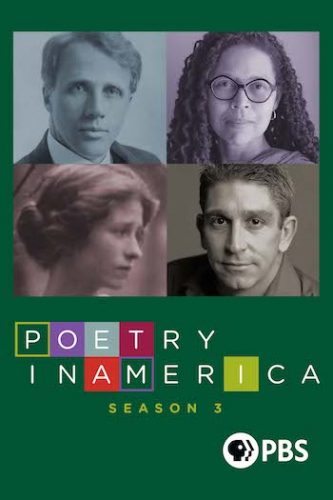Television Interview: “Poetry in America” Host Elisa New — “Poetry is in all of us”
By Robert Israel
“Viewers are drawn into an active, immersive experience watching the series. They come away with the feeling that poetry is in them.”
 Calling itself a “multi-platform education imitative,” Poetry in America is a series of half-hour public television broadcasts that explores the depth and breadth of poetry in the United States. It also serves as a free online course that will help students (and others) better understand American verse as they hear it read by a variety of interpreters. The series first aired on public television in April 2018. The third installment kicks off on January 23 on Boston’s PBS station WGBH.
Calling itself a “multi-platform education imitative,” Poetry in America is a series of half-hour public television broadcasts that explores the depth and breadth of poetry in the United States. It also serves as a free online course that will help students (and others) better understand American verse as they hear it read by a variety of interpreters. The series first aired on public television in April 2018. The third installment kicks off on January 23 on Boston’s PBS station WGBH.
Arts Fuse spoke with Poetry in America‘s director and host Elisa New, Powell M. Cabot Professor of American Literature at Harvard University, about the origins of the project and what viewers and students can expect from the new season.
Arts Fuse: Your educational training is as a classroom English teacher. Why did you turn to television?
Elisa New: I’ve always seen teaching of English and literature as a challenge, especially when it came to teaching poetry. I’ve always wanted to turn my students into lovers of poetry. I wanted them to learn the social and historical contexts of the literature we were reading. For me, learning about literature is an adventure. So I’d bring in props to my classroom, teaching aides, media, I’d play whale sounds in class, for example, anything to engage students, to help them to better grasp the larger context of what we were studying. I used to wheel a little suitcase down the corridors, and in this suitcase would be all my props. And I’d bring in films to show in class, too.
AF: Did Harvard support your use of video as a teaching tool?
New: Yes, at the time, we’re talking early in 2012, Harvard was actively engaged in producing online video courses. Many of us on the faculty were approached and many of us jumped on the opportunity to get involved. I discovered that it was a very organic process, since poetry is immersive. I found that it’s not a far jump from the classroom to the small screen. Someone mentioned to me, after I made a couple of these shows, that our local public television station WGBH might be interested in what I was doing. It was suggested that I should talk to them. So I did. And poof! It happened. That’s how I found myself making documentary television shows.
AF: When you began the series, did you expect it to have the impact it has achieved?
New: No, not at all. I expected that first season would contain all the television I would ever make. That first season consisted of 12 half-hour episodes. If I had known this would be an ongoing project, I would have most certainly split the episodes up into two seasons.
AF: What can viewers – and students – expect from Season 3?
New: Season 3 begins with a discussion of Walt Whitman’s poetry. Whitman was totally changed by the events of the Civil War. We explore how his experiences bandaging soldiers in Washington, DC, changed his work. We have readers and interpreters on the show. One of these is actor David Strathairn; another is playwright Tony Kushner. We bring variety to the shows. We film each segment in different locations. We visit Miami, for example, and talk with poet Richard Blanco about his roots and experiences as a Cuban-American and how that shaped his poetry. Our interpreters come from every age and ethnicity. Our aim is to make each show accessible to viewers.
AF: A global audience is now viewing Poetry in America. If you could pinpoint one aspect that draws viewers to the show, what would that aspect be?
New: I would say it’s the immersive aspect of poetry itself, the fact that when viewers watch the series they can say to themselves, “Yes, I was thinking that, too.” When poetry used to be taught in classrooms, it was always on the page. Shakespeare’s sonnets, for example, always sounded lovely but somehow they were not connected to us. Viewers are drawn into an active, immersive experience watching the series. They come away with the feeling that poetry is in them. And that’s as it should be. Poetry is in all of us.
Robert Israel can be reached at risrael_97@yahoo.com.
;
